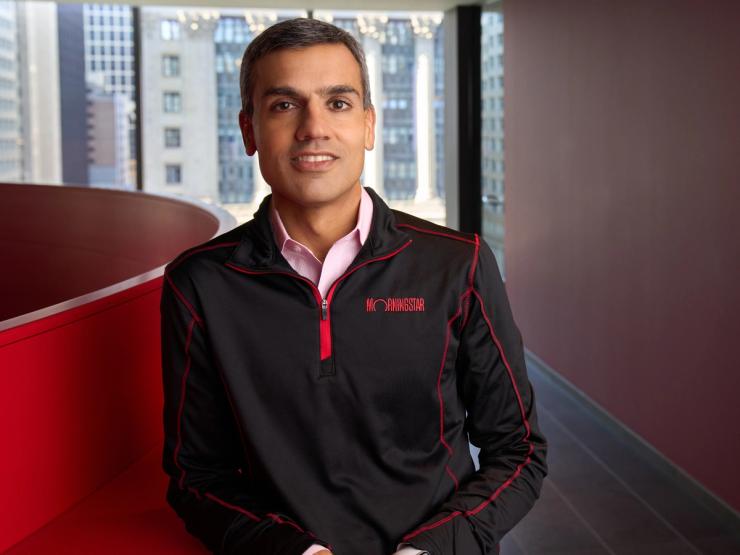The Scene
Kunal Kapoor’s first job at Morningstar in 1997 involved entering fund data by hand that he had pulled off a fax machine. It’s a role the investment research company automated long before its Kapoor-led push into the AI chatbot era. But he says his roots as an analyst have informed a leadership culture that encourages independent thinking, debate, and even argument.
Since becoming CEO in 2017, Kolkata-born Kapoor has emphasized innovation as he has expanded Morningstar internationally and broadened its offerings. His push to create “a common language” for tracking private market investments, making them accessible to more investors, has helped the Chicago-based company’s market valuation more than double in the past five years to $12.5 billion.
Morningstar took its name from Henry David Thoreau’s Walden, and both Kapoor and founder Joe Mansueto cite Warren Buffett as an inspiration. Speaking recently on a day when markets were down, Kapoor said his firm’s message to investors was “stay the course” and — quoting the outgoing Berkshire Hathaway CEO — “be greedy when others are fearful.”
Here’s how Kapoor describes his leadership and Morningstar’s culture.
This interview has been condensed and edited for clarity.
The View From Kunal Kapoor
Andrew Edgecliffe-Johnson: What do you look for in the people you hire for your top team?
Kunal Kapoor: Hiring is impossibly difficult, and I’ve made spectacularly bad decisions over time. When Morningstar was a growing company, we’d often [say], “Oh, if only we could have this person from X bigger company or Y bigger company. They know what to do, and we just don’t.” So we got a couple of executives from well-known firms, and we set them up to fail, because we brought them in with this hero mentality. Our culture spat them out, and they spat at our culture. So one of my life’s lessons was: OK, first, no heroes.
I think a lot about the mix of my team. You need to have the straight lines offset with some squiggly lines. And the squiggly lines piss off the straight lines, and the straight lines piss off the squiggly lines. And that makes it harder for the CEO, and that’s really good. If sometimes you have an argument go on, or teams not agreeing, that’s okay at a certain level. You want that, but you want people to commit when it’s time to commit. And that’s my role: to be sure that once the argument needs to end, it ends.
So you’re happy allowing a little tension?
Yeah. I’m an analyst, so I grew up in a world of tension. My toughest manager at Morningstar was the guy who was my manager when I was an analyst, because he wouldn’t let my research go out until there were six or seven revisions to it. We used to debate as analysts, and that’s the core of being a great analyst. Sometimes, analysts struggle to go to general management positions because you’re such a strong individual contributor, and you’re very much geared up for conflict.
How have you changed as a CEO over time?
First of all, you’re always trying to prove yourself; that does not change. And what also does not change is the responsibility that you feel for everybody who works at the firm.
Where I’ve evolved is I’ve tried to scale myself in the way that the business has scaled, and I’ve also just been honest about what works for me and what doesn’t. One of the things that’s really important is my voice. I write my stuff, I say what I want to say, and I say it in a way that hopefully is authentic, but also demanding enough. And one of the ways to gain confidence as a CEO, once you have a record, is you can be more demanding and you can do it authentically, and people understand where it’s coming from.
You don’t do quarterly earnings calls or forecasts for investors. How do you manage to get away with that?
They don’t need to own the stock, if that’s the mode that they want to operate in. Our investors take a long-term approach, and they’re clear about the ground rules that we operate in. And candidly, if I was to ask them, “Would you rather I spend time with clients and building things internally, or going out on calls to talk about the stock and the company?” I think they would tell you the first two are more valuable.
Every month, we answer questions in a filing, so anyone can send us a question, and we write long, detailed answers. Then I write a quick, short quarterly letter with earnings, and then a long annual letter. And we do the annual meeting where we sit and answer questions for a couple hours. [Founder] Joe [Mansueto] took inspiration from Warren Buffett when it came to some of these things. And it’s funny; I haven’t met a single CEO who says it’s a bad idea.


